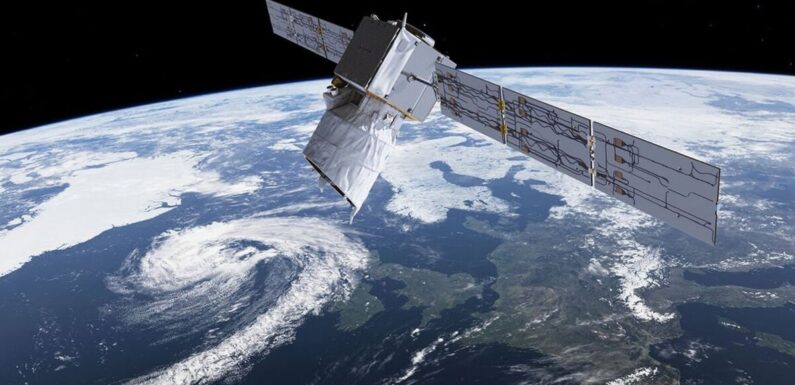
European Space Agency details reentry procedure for Aeolus satellite
British-built satellite Aeolus, dubbed “the impossible satellite”, is scheduled to crash into the Atlantic Ocean today after completing its five-year mission to map the planet’s complex system of winds.
The pioneering spacecraft earned its nickname after scientists struggled to develop an ultraviolet instrument that could operate for long enough in the vacuum of space.
The European Space Agency (ESA) has been preparing for the “assisted re-entry” for the last week, describing the satellite as “our trailblazing keeper of the winds”.
Weighing just over a ton and the same size as a small car, 20 percent of Aeolus’s hardware is likely to survive the journey through Earth’s atmosphere.
Consequently, ESA flight controllers have been lowering its altitude with a series of manoeuvres, the last of which should drop its altitude to 75 miles.
At that point, the drag from the atmosphere should be sufficient to pull it down.
Don’t miss… Now Gina Miller dragged into Farage row with her party’s bank account to be shut[LATEST]
Operations director Isabel Rojo told the BBC: “We expect it to re-enter somewhere over the Atlantic Ocean, moving in a south-to-north direction.”
Any debris which does make it to Earth will likely consist of parts of Aeolus’s telescope and fuel tanks but given – although the remoteness of the likely location means the risks are minimal.
The UK Space Agency, which is affiliated with the ESA, tweeted: “Bye @esa_aeolus!”
The satellite, named after the ruler of the winds in Greek mythology, was built by Airbus Defence and Space in Stevenage.
Other British businesses supplied elements critical to the mission, such as a camera, software and propulsion systems.
The substantial extent of UK participation was achieved by the UKSA’s ongoing involvement in ESA’s Earth Observation Envelope Programme.
Speaking at the time of the launch, from Europe’s Spaceport at Kourou in French Guiana in August 2018, then-Science Minister Sam Gyimah said: “The Aeolus mission is a great example of the potential real-world impacts that space can have on Earth.
“Its data will lead to more reliable weather forecasts that can be used by farmers, seafarers, construction workers and others to improve productivity and safety.
We use your sign-up to provide content in ways you’ve consented to and to improve our understanding of you. This may include adverts from us and 3rd parties based on our understanding. You can unsubscribe at any time. More info
Don’t miss…
NASA’s Webb telescope captures dazzling image of actively forming young stars[PICTURES]
Pentagon whistleblower says UFO tech ‘most powerful seen'[VIDEO]
Satellite plummets towards earth using rockets ‘not designed for re-entry’[EXPLAINED]
“Space is a key part of our modern Industrial Strategy and it is work like this that shows how vital our role in the European Space Agency is in bringing real benefits to UK companies.”
Aeolus is the fifth of ESA’s Earth Explorer missions, aimed at addressing critical Earth science issues using cutting-edge technologies.
Also speaking in 2018, James Cotton, Satellite Winds Scientist, at the Met Office, said: “The Aeolus mission aims to improve the global coverage of wind profile observations, including areas where in situ wind measurements are currently lacking, such as over the oceans, in the tropics and the Southern Hemisphere.
“Within numerical weather prediction, we expect the Aeolus winds to be particularly useful for improving our analysis of the atmospheric state in the tropics, a region where we know the model wind errors are large.”
Colin Paynter, Managing Director of Airbus Defence and Space Ltd, said: “The UK contribution to Aeolus, by the alliance of UK SMEs and established players led by Airbus, was first class, delivering a revolutionary Earth observation satellite that will give wind profile data in near real-time, improving weather forecasting and helping to bring the benefits of space down to every citizen on Earth.
“Airbus was honoured to lead Team UK to deliver this spacecraft.”
ESA members including the UK have backed a budget of £353million to start work on two follow-up satellites named Aeolus-2.
The UK’s £60million ESA contribution means Airbus will probably once again lead the production process.
Source: Read Full Article



